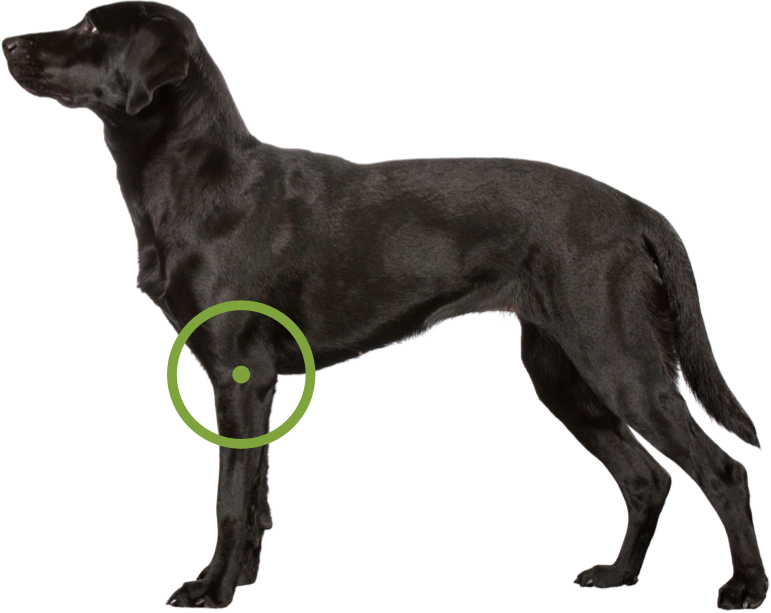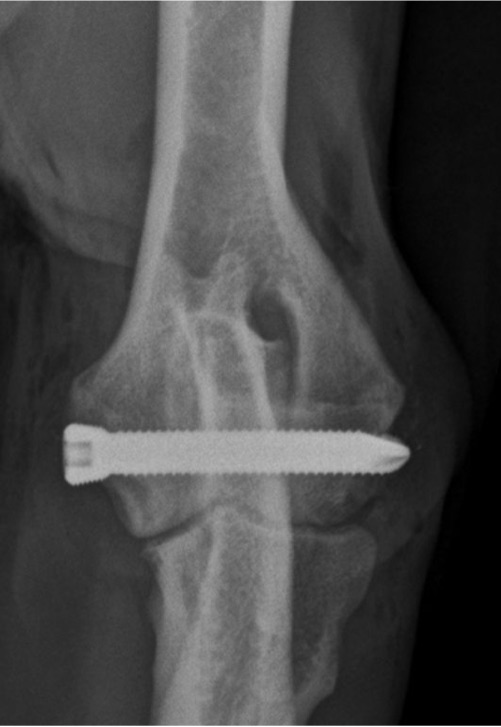What is humeral intracondylar fissure?
A fissure, or crack, within the humeral condyle of the elbow, often seen in spaniels, especially English Springer Spaniels
Humeral intracondylar fissure (HIF) is a condition in which there is a weakness in the humeral condyle – part of the elbow joint in the forelimb. In the past it was called incomplete ossification of the humeral condyle (IOHC), implying it was associated with growing, but in most dogs it is a form of stress fracture, hence the name change.
This condition can result in a very serious sudden-onset complete fracture of the humeral condyle but it can also cause a low-grade persistent lameness without complete fracture. It is often hard to diagnose – and it may take assessment by a specialist and a CT scan to do so. It can affect many different breeds, but HIF is most commonly found in spaniels, especially English Springer Spaniels.
Andy Moores is an internationally-recognised expert on this condition. He has been treating and studying dogs with HIF for over 20 years and has published multiple scientific papers on the condition. Read Andy’s blog to learn more about this condition.

Why Moores Ortho?
Andy Moores is an internationally-recognised expert on this condition and he and Chris have a wealth of experience in managing HIF and HIF-associated fractures. They can utilise their expertise and experience to advise you on whether surgery is appropriate for your pet or not, and carry out the most appropriate surgery if it is.
At the Moores Orthopaedic Clinic we can offer:
- Expert assessment of your pet, including elbow CT scanning, to ensure surgery is the right choice for them
- Highly experienced HIF surgeons
- A purpose-built modern clinic with facilities designed to minimise the risk of complications after orthopaedic surgery
- Detailed aftercare instructions and support during recovery including discounted physiotherapy packages
- Personal and professional service
- Very competitive pricing
What can you expect before and after surgery
We will assess your dog and advise an elbow CT scan if we agree HIF is likely.
We will discuss the pros and cons of surgery with you
Your pet will go home with a detailed postoperative care plan and any necessary medications.
Limitations in activity are essential, especially within the first few weeks. These will be detailed on the postoperative care plan. We will always be available for advice if you need us and we will encourage you to return to the clinic to check on your pet’s recovery and progress.
After recovery, most dogs can expect a return to full activity.

FAQs
What is humeral intracondylar fissure and how do you treat it?
The humeral condyle is an integral part of the elbow joint. It is the most distal part of the humerus, the upper bone of the forelimb. In some dogs, a fissure, or crack, forms across the humeral condyle, which weakens the condyle and predisposes the humerus to fracture. Surgery involves placing a large screw (transcondylar screw) to strengthen the condyle. Because it is a large screw, it is essential the screw is placed accurately.
How much does humeral intracondylar fissure surgery cost?
HIF requires a CT scan for diagnosis and surgical planning. Transcondylar screw placement is a technical procedure requiring specialist expertise, equipment and implants, and the price reflects this. Our pricing however is very competitive compared to other centres. To help with your financial planning HIF surgery is a fixed-cost procedure.
What happens if HIF causes a complete fracture?
A complete fracture will always require surgery. Without surgery the elbow will never work normally again, causing pain and lameness. Complete condylar fractures are managed with plates and screws. We have treated hundreds of dogs with condylar fractures and most do very well after surgery, although some degree of elbow osteoarthritis is often seen in later life.
Will my insurance cover humeral intracondylar fissure surgery?
Almost certainly yes, but do check your policy carefully in case there are any exclusions or limits on cover. If you are unsure about your level of cover then please let us know and we can investigate this for you.
Make an enquiry
Request more
information



